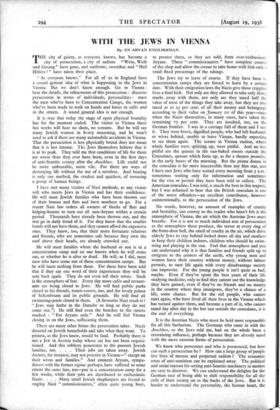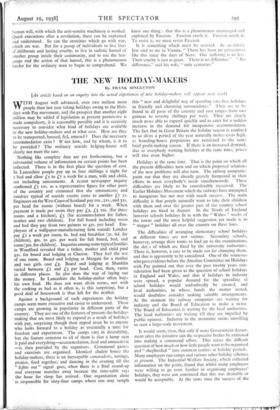WITH THE JEWS IN VIENNA
By AN ARYAN ENGLISHMAN .
THEcitY of gaiety, as everyone knows, has become a city 'of persecution, a city of sadism. " Wein, Weib and Gesang " have gone, and uniforms, swastikas and "Heil Hiders ! " have taken their place.
" As everyone knows." For all of us in England have a sound general idea of what is happening to the Jews in Vienna. But we don't know enough. Go to Vienna : hear the details, the refinements of this persecution : discover persecution in terms of individuals, personalities : meet the men who've been to Concentration Camps, the women who've been made to walk on hands and knees in cafés and in the streets. A sound general idea is not enough.
It is true that today the stage of open physical brutality has for the moment ended. The visitor to Vienna these last weeks will hear no shots, no screams. But he will see many Jewish women in heavy mourning, and he won't need to ask if there are many automobile accidents in Vienna. That the persecution is less physically brutal does not mean that it is less intense. T In Jews themselves believe that it is at its peak. They told me that conditions of life for them are worse than they ever have been, even in the first days of anti-Semitic ecstasy after the Anschluss. Life could not be mote unbearable, more vile. For there are ways of destroying life without the use of a revolver. And beating is only one method, the crudest and quickest, of torturing a group of human beings.
I have met many victims of Nazi methods, as any visitor will who meets Jews in Vienna and has their confidence. He will meet Jewish families who have been thrown - out of their houses and fiats and have nowhere to go. For a recent Nazi law orders all owners of blocks of flats and lodging-houses to turn out all non-Aryans within a certain period. Thousands have already been thrown out, and the rest go in daily dread of it. For they know that the smaller hotels will not have them, and they cannot afford the expensive ones. They know, too, that their more fortunate relatives and friends, who are sometimes safe because they own the roof above their heads, are already crowded out.
He will meet families where the husband or son is in a concentration camp and no one knows when he will come out, or whether he is alive or dead. He will, as. I did, meet men who have come out-of those concentration camps. But he will learn nothing from them. For these have been told that if they say one word of their experiences they will be sent back again. They do not even tell their wives. Such is the atmosphere of fear. Every day more cafes and restaur- ants are being dosed to Jews. He will find public parks closed to his friends, tennis-courts, too, and the lovely palace of Schonbrunn and its public grounds. He will find all swimming-pools dosed to them. (A favourite Nazi crack is " Jews may bathe in the Danube so long as they do not come out.") He will find even the benches in the streets marked : " For Aryans only." And he will feel Vienna dosing in on the Jews, suffocating them.
There are many other forms the persecution takes. Nazis descend on Jewish households and take what they want. To protest, as the Jews know, would be fatal. Probably there is not a Jew in Austria today whose car has not been requisi- tioned. And this robbery penetrates to the poorest Jewish families, too. . . . Their jobs are taken away. Jewish doctors, for instance, may not practise in Vienna—" except on their wives and families." And eminent Aryans, sympa- thisers with the former regime perhaps, have suffered to some extent the same fate, too—put in a concentration camp for a few weeks, while their jobs are distributed to enthusiastic Nazis. . . . Many small Jewish shopkeepers are forced to employ Nazi " commissionaires," often quite young boys, to protect them, so they are told, from overenthusiastic Aryans. These " commissionaires " have complete control of the shop and allow the owner to take home with hire only a small fixed percentage of the takings.
The Jews try to leave of course. If they have been to concentration camps they are forced to leave by a certain date. With their emigration laws the Nazis give those crippled lives a final kick. Not only are they allowed to take only thirty marks away with them, not only are they taxed half the value of most of the things they take away, but they are also taxed as to 25 per cent. of all their money and belongings according to their value on January 1st of this year—since when the Nazis themselves, in many cases, have taken the remaining 75 per cent. They are insulted, too, on the German frontier. I was in a carriage full of them and I saw it. They were brave, dignified people, who had left husbands or wives behind, unable to leave Vienna, hardly expecting to see them again. The scenes in Vienna station, where whole families were splitting up, were pitiful. And no less pitiful are the queues in the sun-baked streets outside the Consulates, queues which form up, as for a theatre premiere, in the early hours of the morning. But the prima donna in the consulate is far more inaccessible than any film star, and I have met Jews who have waited every morning from 5 a.m.. sometimes waiting only for information and sometimes for the visa or permit they have been told to collect. The American consulate, I was told, is much the best in this respect, but I was ashamed to hear that the British consulate is one of the worst offenders—an excellent contributor, however unintentionally, -to the persecution of the Jews.
No words, however, no amount of examples of cruelty and bestiality, can convey to the reader who hasn't felt it the atmosphere of Vienna, the air which the Austrian Jews must breathe. For it is not so much individual acts of persecution as the atmosphere these produce, the terror at every ring of the-front-door bell, the smell of cruelty in the'air, which drive elderly Jews to stay behind locked doors all day and mothers to keep their children indoors, children who should be swim- ming and playing in the sun. Feel that atmosphere and you can understand why it is that Families and friends split up to emigrate to the corners of the earth, why young men and women leave their country without money, without labour permits, to start life. again with every disadvantage society can improvise. For the young people it isn't quite so bad, maybe. Even if they've spent 'the best years of their life studying medicine, only to find they cannot use the knowledge they have gained, even if they've no friends and no money in the country where they immigrate, they've a chance of a life, some chance. But for the old people, who cannot start again, who have lived all their lives in the Vienna which has turned against them, and become a part of it, who' cannot stand day after day in the hot sun outside the consulates, it is the end of everything.
It is the Austrian Nazis who must be held most responsible for all this barbarism. The Germans who came in with the Anschluss, so the Jews told me, had on the whole been a restraining influence, perhaps because they are already sated with the more extreme forms of persecution.
We know who persecutes and who is persecuted, but how can such a persecution be ? How can a large group of people live lives of intense and perpetual sadism ? The economic roots •of anti-semitism can be explained away. The political and social reasons for setting anti-Semitic machinery in motion are easy to discover. We can understand the delights for the German race of being able to shift responsibility for all the evils of their society, on to the backs of the Jews. But it is harder to understand the personality, the human heart, the human will, with which the anti-semitic machinery is worked. Quick executions after a revolution, these can be explained and understood. So can the atrocities which go with war, which are war. But for a group of individuals to live lives of deliberate and lasting cruelty, to live in sadistic hatred of another group inside their community, and to use the la n- guage and the action of that hatred, this is a phenomenon harder for the ordinary man to begin to comprehend. We know one thing : that this is a phenomenon encouraged and exploited by Fascism. Fascism extols it. Fascism needs it. To resist it, we must resist Fascism.
It is something which must be resisted. As an elderly Jew said to me in Vienna, " There has been no persecution like this since the days of Nero. Our suffering is no less. Their cruelty is just as great. There is no difference." " No difference," said his wife, " only centuries."







































 Previous page
Previous page